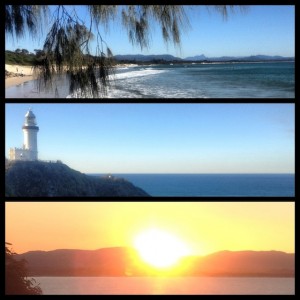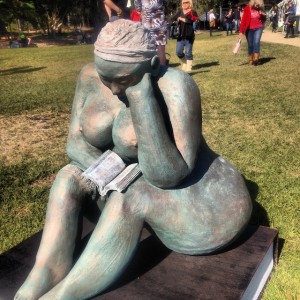First to Perth, on the banks of the Swan River, at the edge of the Indian Ocean. Another Finisterre – the most isolated city in the world, they say.
It’s where I went to school, and where I still have childhood friends and a sister; two brothers, a stepfather and a father; and other relationships that are complex and enduring.
It’s where I walk under a sky of a particular blue, my feet locating themselves on known, but now strange, earth. I smell childhood fantasies on the breeze and catch glimpses of teenage willfulness around corners. I taste the longing for movement I’ve known all my life.
I always want to be my best self in Perth, to make an offering that is pure and generous. I have moments of success, but too many of failure. My patterns run deep there. I settle into them without knowing, then try to escape them. I struggle to create new shapes, new ways of being, and to lay those over the old patterns.
I succeed. I fail. I walk away again.
This time I went to Ubud in the hills of Bali, in the shadow of Mount Agung.
Agung…
Three thousand metres of volcano, rising out of the mist and smoke. It last erupted in the sixties, changing the island and its terrain. It is worshiped and revered. It wears pale cloud to great effect.
I slept in a house made of bamboo, looking across ripening rice and paradise flowers to palm trees and kites. I woke to footsteps on stone, treading a path to the temple outside the window.
 As frog croaks gave way to cock-squawks, and before whirring motorbikes on the road took precedence, they would come, those gliding dark-haired women, preceded by the smoke of incense sticks. They placed offerings at the door, at the family temple opposite, and at the compound gateway. They placed them on the paths to warungs, and at intersections of three roads. Kadek told me that she makes dozens each day. They are like birds’ nests made of bamboo fronds, filled with flowers and rice, fruit and biscuits. The air fills with perfumed smoke as the neighborhood is dotted with these gifts. At every doorway, statue, shop entrance and tree.
As frog croaks gave way to cock-squawks, and before whirring motorbikes on the road took precedence, they would come, those gliding dark-haired women, preceded by the smoke of incense sticks. They placed offerings at the door, at the family temple opposite, and at the compound gateway. They placed them on the paths to warungs, and at intersections of three roads. Kadek told me that she makes dozens each day. They are like birds’ nests made of bamboo fronds, filled with flowers and rice, fruit and biscuits. The air fills with perfumed smoke as the neighborhood is dotted with these gifts. At every doorway, statue, shop entrance and tree.
They are infinite in variety and content.
They make me wonder about the offerings I make; the moments when I pause in the day, as they do, to stop and acknowledge ancestors or history, or to give thanks. Kadek told me that the Balinese “work so we can have enough food and make our offerings.”
Last Saturday, friends cooked lunch for six of us at their home in the rice fields. We sat at their table and ate a mix of Balinese and western flavours. We laughed and told stories. We spoke of gratitude for such beauty and good luck; for peace and generosity.
As ducks went about their business, filling the neighbourhood with racket and making me laugh out loud, we shared news from the wider world. Boats of refugees. Casualties of war. Carping and insults in western politics. Intolerance. Vindictiveness. Such things seemed impossible, at that table. Unthinkable.
On the narrow path home, the women ahead of me carried tiles and cement to a construction site. They all smiled and greeted me as I passed. A Balinese man who had worked in Dubai for two years spoke of his relief at coming home. In Dubai, he said, they told him not to smile all the time because people would think him foolish, or grasping. For a Balinese, he said, this was heart breaking. He was relieved to be home where his smile could be free.
 Overhead, elaborate woven banners swayed in the breeze, ready for Galunggan, when the forces of good and bad do battle. Good will win, Wayan told me, as he plaited palm fronds into intricate patterns. The tall banners arched like the backs of the elegant women bearing building materials.
Overhead, elaborate woven banners swayed in the breeze, ready for Galunggan, when the forces of good and bad do battle. Good will win, Wayan told me, as he plaited palm fronds into intricate patterns. The tall banners arched like the backs of the elegant women bearing building materials.
I took myself on snail-pace caminos, hours of early morning hills and ridges. Everything thrives there. Grasses sway and palm-trees tilt. The green got higher and deeper as I walked. I kept stopping to marvel at the bigness of their bumblebees, the scale of their snails, and the wealth of species. The density of the undergrowth. The patterns. The beauty. The growth….
 There seemed to be order among all that wild sprouting. As though the winds had worked in concert with the grasses to produce artworks to rival any old master’s. Wisdom at work in the landscape spoke, as it always does to me, through my feet. Again I heard it, the repetition, in all languages, of the mantra I must try to remember….
There seemed to be order among all that wild sprouting. As though the winds had worked in concert with the grasses to produce artworks to rival any old master’s. Wisdom at work in the landscape spoke, as it always does to me, through my feet. Again I heard it, the repetition, in all languages, of the mantra I must try to remember….
 Tidak apa apa. No pasa nada. No worries.
Tidak apa apa. No pasa nada. No worries.
Of course there are problems. And things must matter out in the wide world where people are disputing boundaries, rights and entitlements. But for a brief interlude, I de-twitted, read few newspapers and listened to another kind of broadcast. I walked and walked at the pace of a tropical snail, and when I returned to Perth, old patterns could be seen for what they were. Building blocks. Attempts. Offerings. Steps toward understanding – of self, family, friends. Of journeys and mistakes made.
 And now I am back in Melbourne, where the air is chilly and the magnolias are showy. Home. Reflecting…
And now I am back in Melbourne, where the air is chilly and the magnolias are showy. Home. Reflecting…
In Ubud, I looked into a rice field and I saw the sky. Sometimes, if we go slow, we can look into the past and see the future – or at least a glimmer of what might be possible.
A POSTSCRIPT OR TWO
For Melburnians…
On the 16th September, I will be reading at Marieke Hardy and Michaela McGuire’s latest Women of Letters afternoon. They sell out almost immediately, and raise money for a wonderful charity, so do get in quickly if you are keen. Marieke wrote…
For your records, the breathtaking lineup is as follows:
Intrepid writer, actor and walker AILSA PIPEREsteemed playwright, thespian and all-round awesome lady KATE MULVANYDoyenne of Australian literature HELEN GARNEREditor of Meanjin and associate publisher at MUP SALLY HEATHAnd adored chanteuse SARAH BLASKO.Doors open at 2:30pm for a 3pm start. Rock up early and have a glass of wine and marvel at the mirrored walls in the Theatre’s downstairs ballroom.The topic of your particular letter for September is ‘A letter to my unfinished business’.





























